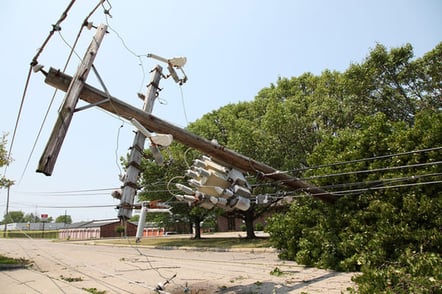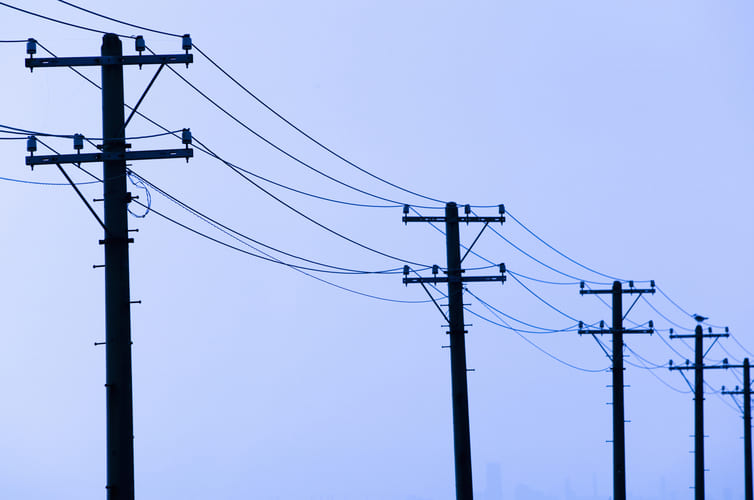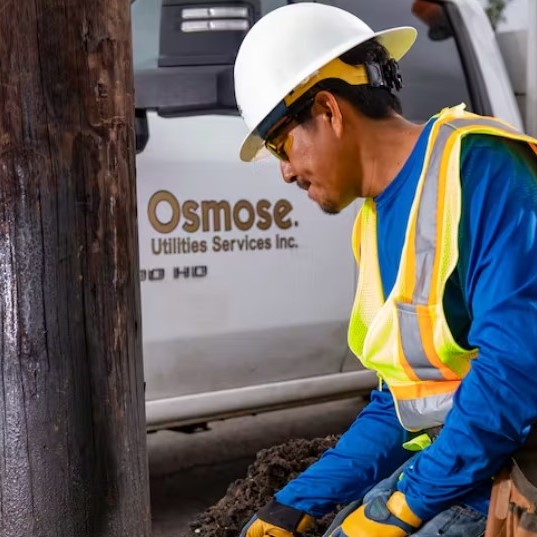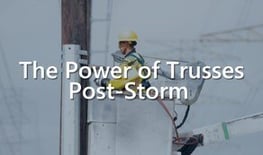Resiliency as a Service (RaaS)®
 Current distribution overhead line structures may not be strong enough for the next major storm that can down powerlines and cause significant outages and long restoration times.
Current distribution overhead line structures may not be strong enough for the next major storm that can down powerlines and cause significant outages and long restoration times.
These same structures are expected to carry additional attachments from broadband and 5G deployments. These critical assets not only carry a lot of weight and responsibility, but also a lot of risk if they aren't evaluated, restored, or strengthened appropriately.
A replacement-only strategy of high-risk vulnerable assets with stronger structures is an inefficient use of capital budgets, time-consuming, and laborious.
Osmose’s grid structure experts have developed a targeted structural Resiliency as a Service (RaaS)® program that is risk-informed, targeted, and data-driven. It allows utilities to execute 5x faster with 5x more cost savings, and extend their pole lifespan by over 40 years.
With Osmose's Grid Hardening Approach
5x cost-savings
than replacement-only
5x faster
than replacement-only
40+ years
pole lifespan extended
Five Steps to More Resilient Distribution Structures
Start with Circuit Prioritization
Osmose begins its resilience investigation with Osmolytics®, a unique predictive analytics solution that examines grid structure age and risk scenarios to identify targeted focus areas. Osmose can help prioritize heavily loaded circuits using data provided by the utility and simulating estimated loads under given weather conditions.
Collect Detailed Structure Data
Once prioritized areas are determined, Osmose deploys trained and experienced field crews to collect detailed structure data. The ever-expanding OsmoVision® toolset allows for accurate and detailed data collection, and efficient AI-enabled processing of both LiDAR and other state-of-the-art data capture and visualization technologies to provide resilience analysis and modeling.
Model Your Pole’s Capacity
The processed data is then imported into Osmose’s O-Calc® Pro utility structure analysis software. O-Calc Pro simulates each asset's construction and structural capacity against defined weather scenarios and considers the poles’ current health.
In-Depth Look at Pole Plant Health
Without a comprehensive pole assessment and treatment program, the full structural analysis is missing a key component: remaining strength. With a groundline assessment program, each pole gets a detailed below-ground assessment, remaining strength calculation, and remedial treatment applied to arrest decay and retain the remaining strength.
Better Solutions, Less Replacement
With data collection, assessment, and modeling complete, Osmose can recommend solutions for any pole found below the resiliency standards set by the utility. Osmose has a family of trussing systems that are prescribed and installed for significantly less investment than pole replacement.
There are trussing solutions for poles that need:
- Core strength restored due to decay or damage. (Tough Truss® Core)
- Extra bending capacity along with strength restored. (Tough Truss® Extra)
- Upgrade to the bending capacity, sometimes by multiple classes. (Tough Truss® Upgrade)
If a trussing solution is not utilized, Osmose can provide pole replacement design recommendations by trained pole modeling technicians.
Our Results Speak for Themselves
60 Years
Trussing solutions commercially available
1.4 Million+
Trusses installed since 2004, for over 230 utilities
Over $4Billion
Industry saving in avoided replacement cost
30 years
Average life extension
Benefits of a Distribution Resiliency Program
Cost-Effective – Targeted analysis means only structures in need of a solution receive them, and the Osmose trussing solutions are typically installed for a quarter or less of replacement cost.
Efficient – Osmose grid resiliency solutions are implemented faster than replacement-only programs.
Engineered Solutions – Osmose programs are specifically tailored to the complex needs of the utility and its distribution structures.

Get a free, no-obligation consultation with an Osmose distribution resiliency expert.

White Paper
The Power of Trusses Post-Storm Research Proves Trusses are a Long-Term Solution
The increasing frequency and severity of extreme weather events have elevated resilience to a major concern for grid owners.
White Paper
Creating a New Model for Resilience in the Heartland
For OG&E, reducing disaster recovery time is a top priority. After a 2020 ice storm knocked out power, it had to change how it looked at resiliency.

%20(1).jpg?width=263&height=157&name=Screenshot%202022-09-13%20104418%20(1)%20(1).jpg)
.png?width=243&name=Osmose-logo-(white).png)